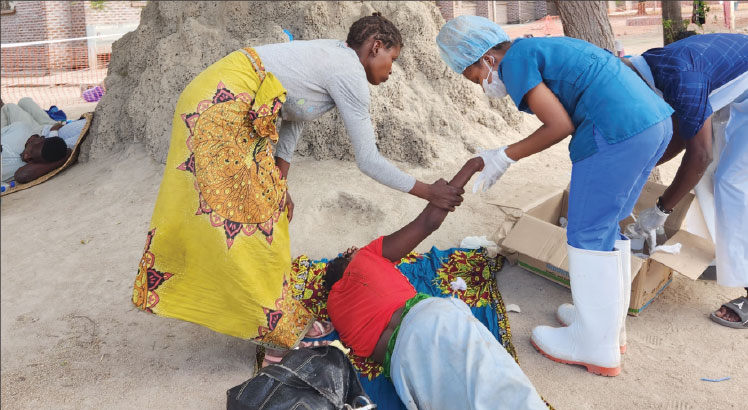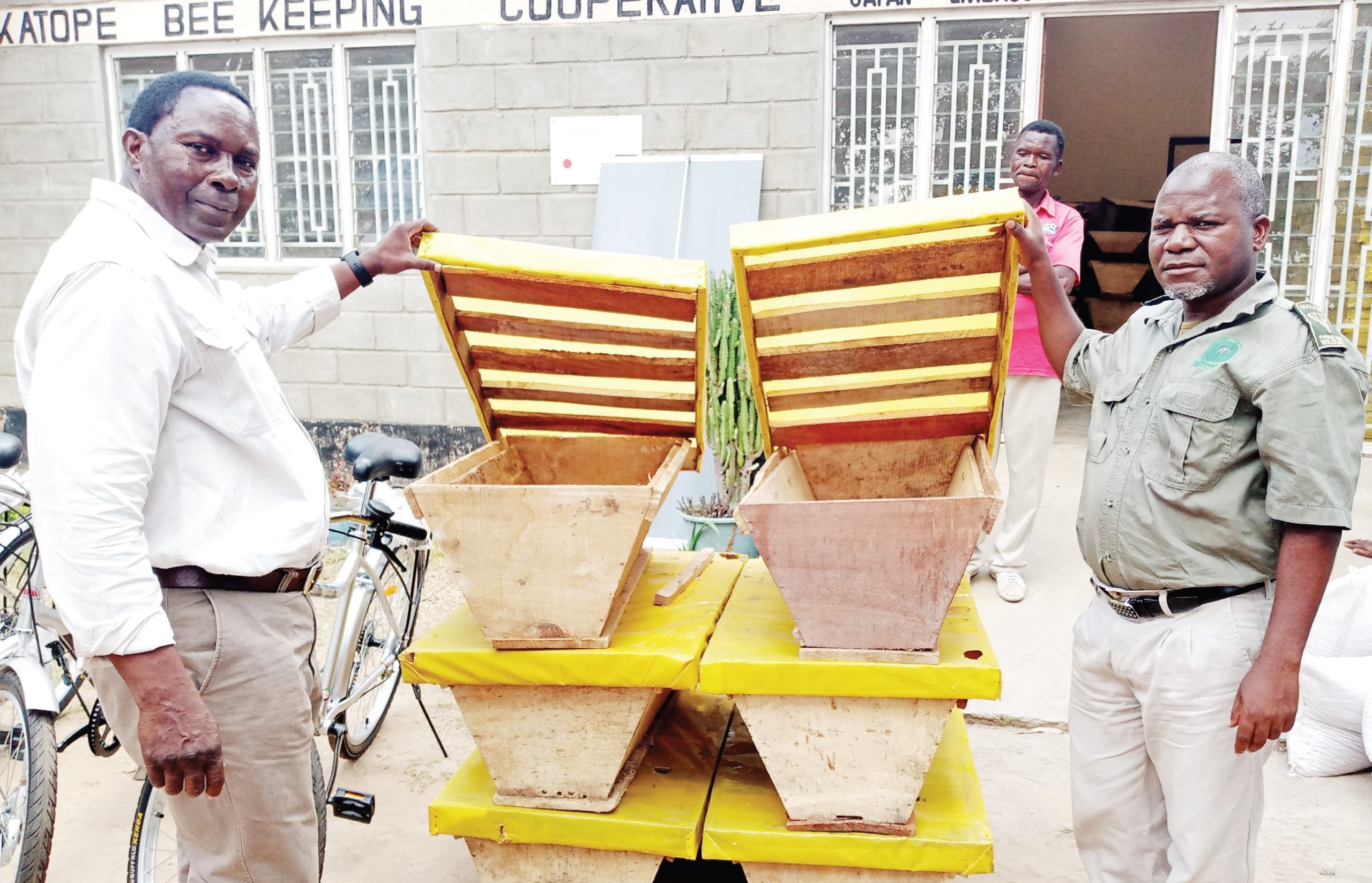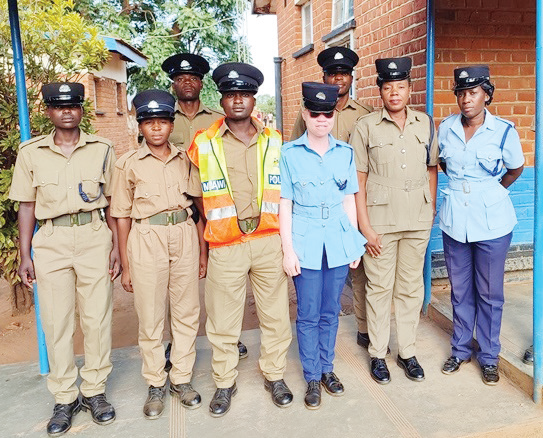Chief champions fight against cholera
Village head Magombo in Machinjiri Township in Blantyre is seen moving from house to house interacting with her subjects.
This is unusual, because in normal circumstances it is the people that frequent the village head’s house, mostly upon being summoned.

But, in an interview, the village head reveals something inspiring.
She says: “I am checking whether these homes have latrines. As you know, the country was hit by cholera, which has claimed a lot of lives.
“So, I need to ensure that every home has a good latrine and that sanitation is good. I believe this is all we, as traditional leaders, can do to assist.”
Magombo says, among other things, she has been advising her subjects to be putting chlorine in drinking water and avoiding open defaecation.
The chief, however, says she is saddened by people who litter the environment with pampers. She says during rainy season, like now, rain water washes away pampers that end up in wells which, elsewhere they are the only sources of water that people fetch to drink.
Says Magombo: “Again, I sometimes wonder how some people look after their children. They allow them to play in rain water without worrying about where that water is coming from.
“We will continue to sensitise our people about cholera, its causes, how it spreads and how it can be prevented. We have committees dealing with this.”
Machinjiri is one of the areas that were heavily affected by cholera in Blantyre and many of its patients were referred to Makheta Clinic where tents had to be erected to accommodate the patients.
The clinic’s nurse-in-charge, Unikani Mthipela said the situation was better in January this year compared to December last year.
“When cholera was at its peak, not even the tents were enough. What was more worrisome was that some of the people who brought cholera patients ended up contracting the disease,” she said.
Mthipela agreed with Magombo on the need to take preventive measures so that cholera does not spread again.
Mthipela said they have taken a number of interventions, including distributing chlorine and health talks, aimed at containing the disease.
According to her, it has become a norm that discharged cholera patients are given chlorine for treating their drinking water at home.
“Of course, many people complained that it [chlorine] changes the taste of water. But sometimes it is important to take a little pain to avoid a bigger one,” warns Mthipela.
She acknowledges the role traditional leaders such as Magombo play in the fight against cholera. She says health surveillance assistants and volunteers continue to work with them to enforce sanitation and hygiene.
At national level, Ministry of Health spokesperson Adrian Chikumbe says they were working hard to ensure that the disease is contained.
He says the fact that there is a presidential committee on cholera shows commitment from the top.
“The will to fight cholera is even in the Office of the President and Cabinet where there is a Presidential Task Force on Cholera. Government is playing a supervisory role to ensure that all activities in the fight against cholera are coordinated,” he says.
Chikumbe warns that although there is a reduction in cholera cases in some areas, the problem remains acute in other areas.
A number of ministries, including those of water, education, health and civic education took leading roles in ensuring that many people do not contract the disease.
Perhaps, the busiest was the Ministry of Water Development and Sanitation. For example, the country’s water boards disconnected many kiosks due to non-payment of bills resulting in many people resorting to drinking from unprotected water sources such as wells and even rivers. Minister responsible Abida Mia ordered reconnections.
In January, when cholera was at its peak, government suspended schools in Lilongwe and Blantyre, as one way of ensuring that the disease did not spread, according to Health Minister Khumbize Kandodo-Chiponda.
But the decision did not please some quarters such as the Private Schools Association of Malawi trustee Hastings Moloko who wondered why government was selective in the decision considering that the problem affected the whole country.
He said: “While some students are not learning, others everywhere in the country are. And yet these students will sit for the same examinations and at the same time. So, Blantyre and Lilongwe students will be disadvantaged in terms of time to cover their syllabuses.”
In December last year, President Lazarus Chakwera declared the outbreak a public health emergency. But seeing that there was little change on cholera prevalence, on February 13 2023, the President launched a campaign called ‘Tithetse Cholera’.
The President was particularly concerned that efforts by government to deal with cholera were not bearing fruit, attributing it to resistance to lack of people’s behavioural change.
Said Chakwera: “Nothing government does will stop this scourge without changes in behaviour. And because behaviours are not changing, the situation has become dire as more than 1 300 funerals have happened across the country.
“Cholera does not respect your gender, education, income, intelligence or age. It is a deadly disease that can kill within hours or days after infection. So if you want to stay safe, you must keep yourself safe.”
The President took a swipe at people who do not have latrines, but take pleasure to relieve themselves in the bush.
He said human beings are not animals that can use any place as toilet, which, he said, does not need a donor to have it.
“A toilet is not something that is given to you by government or something that is donated from abroad or something that comes from heaven. It is something you give yourself as a human being because you respect yourself as being better than an animal,” said Chakwera.
A number of organisations are taking part in the battle against cholera. One of them is Amref Health Africa, an African-led international organisation that provides training and health services to over 30 countries in Africa.
Amref country director Hester Nyasulu said they are supporting district health offices with key medical supplies, conducting community sensitisation campaigns as well as coordinating the cholera response.
He said: “Our support is mainly aimed at contributing to the reduction of cholera deaths by ensuring that treatment supplies are available in [hospital] facilities.
“The donated cholera supplies that we have made so far include chlorine for household water treatment, gloves, hand sanitisers, cotton wool, buckets with taps, intravenous fluids [lingers lactate] oral rehydration salts and cannula needles.”
Although cholera has been overtaken by Covid-19 in terms of prominence, it is still a disease that is should not be ignored.





